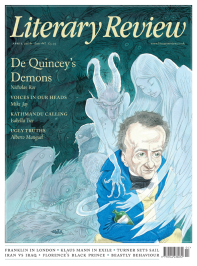Alan Ryan
Rise of the Middling Sort
Bourgeois Equality: How Ideas, not Capital or Institutions, Enriched the World
By Deirdre N McCloskey
University of Chicago Press 787pp £31.50
Bourgeois Equality is the third and final volume in an astonishing trilogy on a familiar question: how to explain the exponential increase in the production and consumption of goods and services of all sorts – what Deirdre McCloskey refers to generically as ‘stuff’ – over the past century and a half. The trilogy is astonishing partly because of its sheer bulk: Bourgeois Equality is almost eight hundred pages long, and its companion volumes, Bourgeois Dignity and Bourgeois Virtues, are scarcely shorter. But the really remarkable feature is its theoretical underpinning.
What these books argue is that the prosperity of the modern world cannot be explained by technological change, or by clear and scrupulously enforced property rights, or by Max Weber’s ‘Protestant ethic’, or by what Marx called the ‘extraction of surplus value’, or by any other of the usual suspects. What explains the explosion in productivity, economic growth and material wellbeing over the past century and a half is changes in ideas. McCloskey has produced something very unlikely: an idealist defence of materialism and an idealist account of how what she calls ‘betterment’ has come about. It is engrossing, even when it is not entirely convincing. It is also written with immense high spirits.
Although McCloskey is an accomplished economist who taught at the University of Chicago and the University of Iowa for over twenty years, she is not really a fan of the discipline; or perhaps, more exactly, she is not a fan of the tendency of economists to think that their picture

Sign Up to our newsletter
Receive free articles, highlights from the archive, news, details of prizes, and much more.@Lit_Review
Follow Literary Review on Twitter
Twitter Feed
It wasn’t until 1825 that Pepys’s diary became available for the first time. How it was eventually decrypted and published is a story of subterfuge and duplicity.
Kate Loveman tells the tale.
Kate Loveman - Publishing Pepys
Kate Loveman: Publishing Pepys
literaryreview.co.uk
Arthur Christopher Benson was a pillar of the Edwardian establishment. He was supremely well connected. As his newly published diaries reveal, he was also riotously indiscreet.
Piers Brendon compares Benson’s journals to others from the 20th century.
Piers Brendon - Land of Dopes & Tories
Piers Brendon: Land of Dopes & Tories - The Benson Diaries: Selections from the Diary of Arthur Christopher Benson by Eamon Duffy & Ronald Hyam (edd)
literaryreview.co.uk
Of the siblings Gwen and Augustus John, it is Augustus who has commanded most attention from collectors and connoisseurs.
Was he really the finer artist, asks Tanya Harrod, or is it time Gwen emerged from her brother’s shadow?
Tanya Harrod - Cut from the Same Canvas
Tanya Harrod: Cut from the Same Canvas - Artists, Siblings, Visionaries: The Lives and Loves of Gwen and Augustus John by Judith Mackrell
literaryreview.co.uk